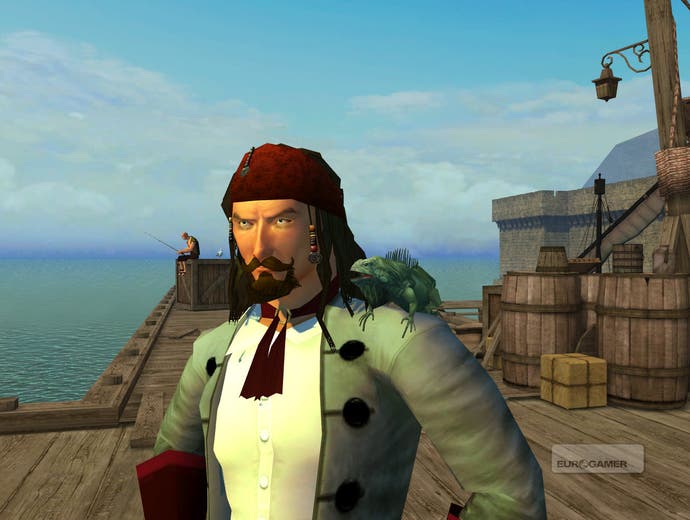Pirates of the Burning Sea
Pieces of... wait.
There are few things in this line of work more beautiful than genuine enthusiasm. It inspires you as a writer - not quite so much as to fool you into giving a shoddy product a critical reach-around, but certainly enough to make you want to commend its creators for giving it a try. And when the enthusiasm accompanies a genuinely excellent piece of interactive craftsmanship, well, that's when you stop regretting the fact that you didn't get a real job with regular pay and overtime and superannuation and everything.
When I met him, Russell Williams - chief executive of developer Flying Labs and one of the pre-eminent creative minds behind nautical MMO Pirates of the Burning Sea - was enthusiastic. His game had only just entered open beta, and already he was gushing about the huge plans he had for it - port revamps, ship dungeons, additional guild features and so on. He demonstrated passion for both his game and its subject matter, and he wasn't haughty about it, either; he was magnanimous towards his competitors, and avoided downplaying Blizzard's efforts as so many up-and-coming MMO developers do.
His exuberance wasn't unfounded: the Pirates beta was a marvellous prototype. Sure, it had its weaknesses - bland avatar combat, samey ports, a sudden, frightening difficulty curve - but it was interesting, uncompromising, and enjoyable in the long term. Of course, that was two years ago. Generous estimates put Pirates' subscriber numbers at around 100,000 at their peak, which isn't too bad considering that Flying Labs was aiming for an EVE-esque slow burn, but it does raise a troubling question: is Pirates still niche because its open-ended gameplay only appeals to a certain type of MMO buyer, or because it's crap?

Before we try to answer that, a brief personals ad for the uninitiated: Pirates is an outgoing, flamboyant two-year-old. Pirates has three main areas of interest: real-time PvP ship combat, attack-queue swordfighting, and free-market economies. Pirates can be a bit of a handful, but with a bit of patience Pirates can prove to be unique and quite easy to understand. Pirates is looking for a long-term partner - preferably someone who smells faintly of balsa wood and PVA glue - as Pirates doesn't dole out its best qualities to newcomers. Pirates likes team players; people who aren't afraid to contribute to a greater cause in a variety of ways. Pirates likes long, arduous journeys at sea and can tell you all about the minutiae of 18th century naval warfare if you're interested. Pirates is of indeterminate gender, but likes to dress up and show a bit of skin, and is probably a Sagittarius.
So, then, onto the Antigua server - reportedly the most populous one of the four in operation. I cobble together a Spanish Privateer - this means he possesses both fiery machismo and a predisposition towards smaller, fast-moving ships which he uses to board bigger ones and behead their captains - and set to work. Pirates is unwaveringly complex, but does its best to spoon-feed newborn buckleswashers until they're ready to take on the big, wide Caribbean. As with EVE Online, it's really a matter of priorities. While I'm interested in making a bit of honest dosh by playing the economy (more on that later), the Privateer is basically a combat role, which is more up my alley. I like killing things.
Privateers (and their somewhat less law-abiding cousins in the Pirate faction) start off with a catch-all small ship called the Halifax Schooner, and, as you might expect, it's rather uninspiring. It's fast, allowing new players to escape open-sea ambushes with relative ease, but is quickly torn apart in any kind of combat encounter. (Mercifully, you're given an endless supply of them.) Early quests get you fairly well-acquainted with the basics of getting your little tugboat around, but do very little to convey the depth on offer as the game progresses.


